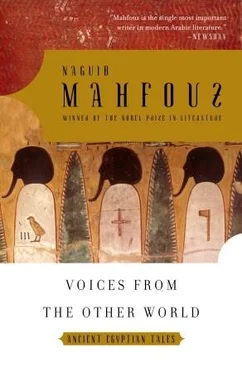The translator thanks Roger Allen, Kathleen Anderson, Hazem Azmy, Brooke Comer, Gaballa Ali Gaballa, Zahi Hawass, Prince Abbas Hilmi, Shirley Johnston, Klaus Peter Kuhlmann, Mark Linz, Bojana Mojsov, Richard B. Parkinson, Donald Malcolm Reid, Veronica Rodriguez, Rainer Stadelmann, Paul Theroux, Peter Theroux, and David Wilmsen for their helpful comments on the present work, as well as Kelly Zaug and R. Neil Hewison for their excellent editing. And, above all, he thanks Naguib Mahfouz — for patiently, as always, answering endless questions about these stories.

Before the first king ruled on the throne of Egypt, the great valley of the Nile was divided into independent districts, each with its own god, religion, and sovereign. One of these nomes, called Khnum, was famed for its fertile soil, favorable climate, and plentiful population. Yet its fate was cruelly wrought by hardships and woes, for while the opulent lived in sin, the peasants went without food. As the wicked dwelt on the land in wanton corruption, disease and pestilence claimed the wretched and the weak. The men in charge of the district — chief among them the magistrate Sumer, the constable Ram, and the physician Toheb — set to work on reform. Their fierce campaign to suppress crime and depravity became the model far and wide for righteousness, integrity, and moral resolve.
During one of the generations that passed in this district, there came a stranger — an elderly gentleman, clean-shaven on both his head and his face (as was the custom for Egyptian priests), tall and gauntly built. His gaze bore a sharp expression, mocking his advanced age, radiating the light of intelligence and wisdom. He truly was peculiar, for no sooner would he set foot in a land than its people would begin to ask in amazement, “Who is this man?. . What country drove him out?. . What does he want?. . And how does he roam the earth at a time when he really should rest in pious peace of mind while awaiting his crossing to the world of Osiris?”
His eccentric character knew no bounds. He left behind him a vortex of disorder and a whorl of uproar wherever he settled down — and wherever he headed. He prowled the markets and the temples, inviting himself to parties without knowing their hosts, injecting himself into what did not concern him. He would talk to husbands about their wives and to wives about their husbands, to fathers about their sons and to sons about their fathers, engaging in argument with the lords and the nobles. He also spoke with the servants and the slaves, leaving in his wake a deep and powerful influence that stirred defiant revolt in their souls, around which disputation and mutual hostility grew ever stronger.
The stranger’s way of life aroused the fears of Ram, the protector of order. He followed him around like his shadow, observing him closely, filled with suspicion about his intentions. At length he seized him and led him to the magistrate, so that he could examine his astounding case. Sumer the magistrate was a man of advanced years and vast experience: he had spent four decades of his magnificent life in heroic struggle under the banners of Truth and Justice. He had personally dispatched hundreds of rebels to their proper fate, and filled the prisons with thousands of evildoers and criminals, as he labored faithfully and sincerely to cleanse the district of the enemies of peace and tranquility.
But when this odd man came before him, Sumer felt astonished and confused. He wondered to himself what this used-up old coot could have done — then, casting an appraising glance upon him, he asked in his weighty voice, “What, venerable sir, is your name?”
The man did not answer. Instead, he remained silent, shaking his head as though he did not wish to speak — or did not know what to say.
The judge, annoyed by his unreasonable silence, demanded harshly, “Why don’t you answer? State your name!”
The man replied in a murmur, a faint, ambiguous smile upon his lips, “I do not know it, sire.”
The magistrate’s anger redoubled, and he demanded scoldingly, “Do you really not know your name?”
“Yes, sire — I have forgotten it.”
“Do you really claim that you have forgotten your own name — the name that people call you?”
“No one uses any name for me: my family and close friends have all passed away. I have wandered in this world for a very long time, but no one addresses me by name. No human being calls out to me, and — with my head overflowing with ideas and dreams — I have forgotten it.”
Sumer berated the old man for his feebleminded senility — then turned away from him in despair to the protector of order. “What drove you to bring this man to my courtroom?” he asked.
“He is, sire,” said Ram, “a man who neither rests nor permits others to rest. He imposes himself upon people and makes them debate both good and evil — and does not bid them farewell until dissension and division have rent them apart.”
The magistrate tilted toward Ram and inquired, “What does he want, behind all that?”
The old man fixed a sharp look upon him. In a voice strong in tone but quavering from the many years that he had dwelt in this life, he replied, “I want to reform this beastly world, my lord.”
The judge smiled and asked him, “Do we not find those who give their lives unstintingly to this noble work when they can? What does the judge, the police chief, or the doctor do? Be reassured, old man, and put yourself at ease, for your great age cannot shoulder this grueling task — there are others more capable than yourself.”
The man shook his head stubbornly and said, “All those that you have cited have been around since the beginning of creation. Yet they have not yet been able to alter this brutality that so disfigures the world. We still see, in every corner of the earth, the harbingers of evil and the plain signs of crime.”
“And are you succeeding, then, even as all these amassed forces have failed?”
“Indeed, sire. . bear with me, and I will show you.”
Amused, the magistrate smiled again, then asked, “And what means do you possess that they do not?”
“My lord, they drive out wrongdoers, treat the sick, and bind up the wounded. But as for me, my method is to eliminate the malady entirely. Disease is a sneak attack on the refuge of our well-being. Those others care only about its symptoms. I have examined this very carefully, and discovered that the stomach is the basis of the malaise in this region. I found many that could not fill its gaping emptiness, so that they howl from hunger. At the same time, others are not only not empty, but consume greedily all that they wish. And from the mutual attraction and revulsion of these two stomachs comes looting, pillage, and murder. So the disease is clear — and the treatment is clear, as well.”
The judge rejoined, “To the contrary: the disease that you have diagnosed has no cure!”
“That is what they say, sire. And they say this only because they lack something crucial to Our Lord: that is, faith in Him, the belief in Virtue. They do not have the proper faith in goodness. They struggle for its sake using passive tools that have no feeling, and labor for wages, status, and glory. And if they retreat unto themselves, worn out by what they declare to be their disgust with sinfulness, then that is their business, sire. As for myself, I believe properly in Virtue — which bids me to proceed down my path, and to do so slowly and gently.”
The man’s speech stirred anger in the constable’s soul, the more so as he seemed to be slandering him right in his presence. But the magistrate, being more broad-minded and softhearted, showed forebearance to what the man said. Finding nothing in his actions to warrant punishment, Sumer released him with a word of caution.
Читать дальше













